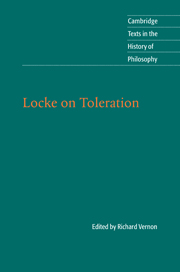Book contents
- Frontmatter
- Contents
- Acknowledgements
- Introduction
- Chronology
- Further reading
- Note on the texts and translation
- Locke on Toleration
- Locke: A Letter concerning Toleration
- Locke: From the Second Treatise (in Two Treatises of Government, 2nd edn, 1698)
- Locke: From An Essay concerning Human Understanding (4th edn, 1700)
- Proast: The Argument of the Letter concerning Toleration, Briefly Considered and Answered (1690)
- Locke: From A Second Letter concerning Toleration (1690)
- Proast: From A Third Letter concerning Toleration in Defence of the Argument of the Letter concerning Toleration, Briefly Considered and Answered (1691)
- Locke: From A Third Letter for Toleration (1692)
- Proast: From A Second Letter to the Author of the Three Letters for Toleration (1704)
- Locke: From A Fourth Letter for Toleration (1704)
- Index
- Titles in the series
Proast: From A Second Letter to the Author of the Three Letters for Toleration (1704)
Published online by Cambridge University Press: 05 June 2012
- Frontmatter
- Contents
- Acknowledgements
- Introduction
- Chronology
- Further reading
- Note on the texts and translation
- Locke on Toleration
- Locke: A Letter concerning Toleration
- Locke: From the Second Treatise (in Two Treatises of Government, 2nd edn, 1698)
- Locke: From An Essay concerning Human Understanding (4th edn, 1700)
- Proast: The Argument of the Letter concerning Toleration, Briefly Considered and Answered (1690)
- Locke: From A Second Letter concerning Toleration (1690)
- Proast: From A Third Letter concerning Toleration in Defence of the Argument of the Letter concerning Toleration, Briefly Considered and Answered (1691)
- Locke: From A Third Letter for Toleration (1692)
- Proast: From A Second Letter to the Author of the Three Letters for Toleration (1704)
- Locke: From A Fourth Letter for Toleration (1704)
- Index
- Titles in the series
Summary
As to ‘using force in matters of religion’ (which are your words, not mine), if you mean by it the using force to bring men to any other religion besides the true, I am so far from owning the question to be whether the magistrate has a right to use force for such a purpose, that I have always thought it out of question that no man in the world, magistrate or other, can have any right to use either force or any other means that you can name to bring men to any false religion, how much soever he may persuade himself that it is the true.
It is not therefore from any alteration, but from the true state of the question, that I ‘take occasion’, as you complain without cause, ‘to lay load on [you], for charging [me] with the absurdities of a power in the magistrates to punish men to bring them to their religion’. But it seems, having little to say against what I do assert, you find it necessary yourself to alter the question, and to make the world believe that I assert what I do not, that you may have something before you which you can confute. And so you undertake to prove, that ‘if upon [my] grounds the magistrate be obliged to use force to bring men to the true religion, it will necessarily follow that every magistrate who believes his religion to be true is obliged to use force to bring men to his’.
- Type
- Chapter
- Information
- Locke on Toleration , pp. 164 - 169Publisher: Cambridge University PressPrint publication year: 2010



